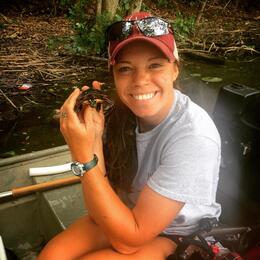Audubon Vermont and the Lake Champlain Sea Grant Institute are excited to welcome Cassie (she/her) as our Conservation Research Fellow. This new, two-year fellowship will focus on improving watershed resiliency across the Lake Champlain watershed, connecting Audubon’s work to protect birds and the places birds need to thrive with UVM Extension’s support for sustainable farming and forestry as keys to watershed health.
Originally from western New York, Cassie Wolfanger spent her childhood exploring the great outdoors and refusing to come inside. She holds both undergraduate and graduate degrees in Environmental Science and Ecology from SUNY Brockport, where her research focused on land use and restoration influences on coastal wetland biogeochemistry.
Previously, Cassie worked for the Vermont Cooperative Fish and Wildlife Research Unit on juvenile lake sturgeon and then for the Vermont Agency of Natural Resources. She’s most passionate about the protection of rare, threatened, and endangered species, and keeping natural places wild for their survival. With a firm belief that a connection to nature must be accessible to all, she values engaging historically underserved communities in the conversation around environmental action and policy. Cassie’s goal is to find the best ways we can be stewards of the land, even in human-dominated landscapes, in order to coexist with wildlife, so this fellowship opportunity is very exciting! Currently, Cassie lives in Richmond where her free time is spent hiking with her dog, kayaking, playing women’s rugby, or Nordic skiing.
News
April 3, 2024
— The second article of a two-part series on grassland birds and bird-friendly pasture management. In this article are some pasture management guidelines that may be considered more bird-friendly. See the first article on grassland bird declines and the role Vermont grazing farmers can play in their survival.
News
March 20, 2024
— The first article of a two-part series on grassland birds and bird-friendly pasture management. Here we’ll explore the unlikely pairing of birds and cows, bird declines, and habitat needs. In part two, we’ll discuss some bird-friendly pasture management guidelines that can be considered.
News
November 15, 2023
— When autumn leaves drop by mid-November, bird nests that were hidden by the lush summer vegetation, suddenly reveal themselves and become apparent everywhere we look. But whose nest was it? Are there ways to tell?
News
October 17, 2023
— Audubon staff joined other conservation groups for a fun-filled outdoor education day at the Dead Creek Wildlife Management Area Visitor Center.
News
April 7, 2023
— Accomplishments and reflections on the partnership between Audubon Vermont and Lake Champlain Sea Grant from 2021 to 2023 to improve bird habitat and watershed health in Vermont.
Priority Bird Monitoring And Management
September 30, 2022
— Recovery of peregrines in the eastern U.S. from the brink is a major conservation success story. Could the re-introduction strategies have possibly shaped the mixed migratory behaviors of the current population?
News
June 23, 2022
— What some of the scientific literature suggests for best native plants, strategic site locations, and ideal buffer structure and scale that are important for enhancing bird habitat in riparian areas.
Bird And Bee Friendly Farming
June 22, 2022
— Take a peek at some of the on-farm habitat work Audubon Vermont, Gund, and the Intervale Center have been doing.
News
February 3, 2022
— The clever behavioral and physiological strategies birds have developed to sustain the harshest conditions of the year will truly amaze you.
